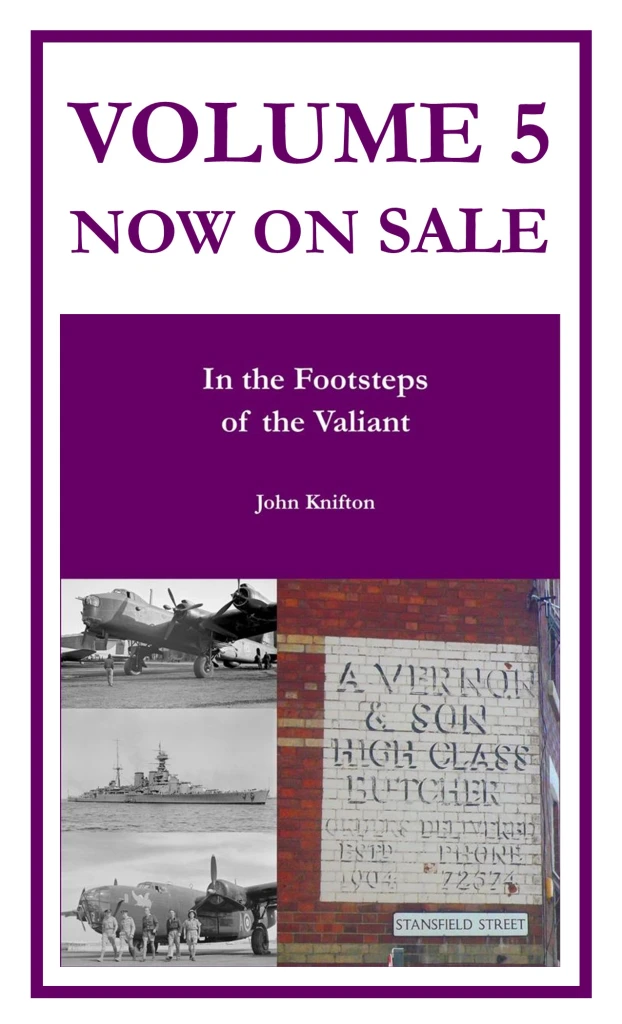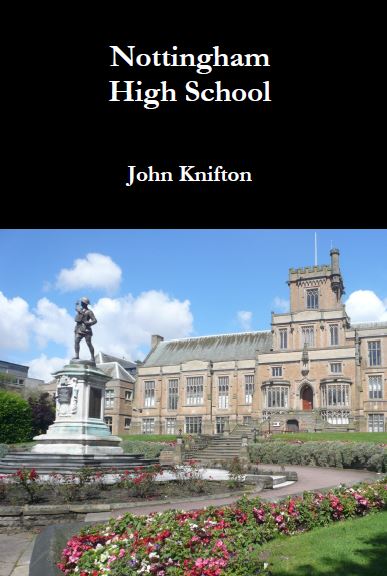This poem was published in the School magazine, the Nottinghamian in July 1939. It was written by Alan Douglas Fluder Howard, the son of a school teacher. Alan was born on December 1st 1922 and the family all lived at 5 Alpha Terrace, between North Sherwood Street and Addison Street, fairly close to the High School. Alan entered the High School on September 2oth 1934, as Boy No 5845 and he studied there until the end of the School Year in 1941 when he left to go to Gonville & Caius College, Cambridge with an Open Exhibition of £40 per annum for Classics and a City of Nottingham Scholarship of £80 per annum. Here’s Gonville & Caius College, or at least, a picture of the entrance to Staircase K:

Alan then seems to have become an illustrator of children’s books such as, for example, “The Pimpernel and the Poodle” and “Limping Ginger of London Town” both of which are still on sale, intermittently, on the internet.
Alan died on Monday April 14, 2008 at the Mount Nursing Home in Shrewsbury. He was the much loved and loving husband of Margaret, the father of Shelagh and Jennifer, the grandfather of Laura, Joanna, Harry, Katy and Zachary and the brother of Marian.
Unlike many Cambridge men of his era, Howard did serve in the war. On October 1st 1945, he received an Emergency Commission to promote him from the ranks of the ordinary soldiers to become a Second Lieutenant in the Royal Signals.
This poem is one of the very best you’ll find in the school magazine. It is set in Blackpool in the very last summer before the war began on September 3rd 1939.
Blackpool was, and still is, England’s Holiday Capital. Its most famous building is Blackpool Tower, jealously copied by the jealous Parisian architects within a couple of years of its completion. There are three piers, North, Central and South, there is a huge Pleasure Beach and Blackpool has literally thousands of things to do. And it also has its problems, as this poem will gradually reveal to you……..

BLACKPOOL, 1939
I like to be at the seaside, the seaside, the seaside,
The jolly, jolly seaside, is just the place for me.
I love the bracing sea-breeze, the sea-breeze, the sea-breeze,
The sewage-fish-and-chips breeze,
Down by the sea.
Oh, how delightful, beautiful, adorable,
Just to spend a day down on the strand !
Gramophones, deck-chairs, chattering lunatics,
And sand sand sand jellyfish sand.
How nice to have a picnic,
All on the seashore,
Down by the briny.
Oh, how grand !
Lemonade, sandwiches,
All gone musty,
Bread-and-Butter, hard as granite,
Seaweed, sand
With sad, shrill wailing, high above the waters,
The slender white seagulls swoop and soar:
Listen to the salt waves softly sighing,
Listen to the breakers crashing on the shore—
“An I says to ‘er, I says—“ “I wanner sticker rock.”
“Johnnie’s gorn an’ pinched me bucket and spide.“
“Let’s ‘ave some fishanchips.“ “Buy me an ice-cream.”
“Wind up the gramophone.” “Pass the lemonide.”
Look at that fat man,
Playing with a beach ball’
Just like a walrus,
Just like a walrus ;
Look at these chocolate papers, toffee papers, newspapers,
And those broken bottles, pleasant for the feet :
Here are the side-shows,
Hark! the showmen softly call—
Giraffe-necked women, three legged women,
Fat women, headless women.
Yonder people half-drunk, two-thirds-drunk, completely drunk.
Not a few hyper-drunk, rolling down the street,
Hurrah ! for the sea-shore,
The sand-castles,
(So-called).
Hurrah ! for the deck chairs,
(Twopence a time) ;
Cheers for the deep sea, the green sea, the dirty sea,
Covered with frothy-brown,
Smelly-brown
Slime.
‘Ray ! for the beastly rock,
Landladies,
Pickpockets,
Roundabouts,
Sideshows,
Gambling dens.
Ray ! for the bandstands,
Machines to tell your fortune ;
No wonder they call us
Homo sapiens.
All that remains now is to show you just one or two pictures of Blackpool. Here’s the beach, pier and tower :

And here is an aerial view of the most famous holiday resort in England:

Here are the attractions in the South Shore area:

Here’s the North Pier. You’d think nobody had heard of any other seaside resort in England. Every single English family and their dog, has turned up:

And here’s the Empress Ballroom in the Winter Gardens:

And finally, a couple of family photographs, both of them taken at Blackpool. First of all, the rather bored little boy is my Dad, born 1922. He looks about eight or nine to me. The lady with him is his mother, my grandmother. Behind them is an escape convict, blending in very skilfully with the cloche hatted crowd :

My grandad, the one who went to Canada and fought in their army, was the husband of the lady above. His father was my namesake, John Knifton, who seems to have acquired a touch of dementia in his final years. On one occasion, at a rather advanced age, he went up to Dr Love’s surgery in High Street, Woodville, and told him that he had come for the job as a doctor. There was, of course, no job. Dr Love went down to see his son, my grandad, and announced to him that “the old professor has really flipped his lid !”
So, here’s the Old Professor:

The lady with him was his second wife, a rather vinegary lady who my grandad and his brothers hated with a will. They would eventually finish up walking down a gangplank onto the docks at Halifax, Nova Scotia, Canada, because of her.
And finally, did you spot him? Staircase K ?





You are right, John. That would take some beating. The family history was interesting, too. I did spot him, but had to look him up to make sure.
I’m glad that you enjoyed it, Derrick. To be honest, I sometimes get rather disconcerted by the various afflictions that crop up among some of my ancestors. I’m sure none of them will happen to me though!
🙂
Wow, that resort sure did (does?) get crowded!!
I liked hearing about your family history and your namesake.
Blackpool still does get rather crowded as far as I know. September to January sees the Illuminations, reckoned to be the largest free light show in the world. You’ll see what I mean if you go to Google Images and just look for “Blackpool Illuminations”.
Quite frequently, standing traffic will start to queue to get into the town 10 or 15 miles from what I believe is called in the USA “The City Limits”.
I took a look at the illuminations – and WOW!!. My favorite is the train!!
Loved the poem, the way he repeated words and the division of lines. I could picture the place. It is a pleasure to look at old photos.
I’m glad you enjoyed it, Lakshmi. The two photographs on the beach were taken by my Grandfather, but the rest of the pictures were in fact postcards taken from the 1930s. Nowadays, it is so difficult to find pictures which do not compromise somebody’s copyright, but postcards get round that problem quite easily.
Sounds like we could do with hearing a little about your amazing family tree. Lovely read. Thanks for stories.
I’m glad you enjoyed it, David. You may be right, perhaps I ought to start using some of the tales told to me by my elders and betters.
I enjoyed the rhythm of Howard’s poem. He was not at all happy about the pollution at his beloved beach and seaside. It’s strange to see beach-goers fully clothed from head to toe.
Until the 1970s, Blackpool was, quite rightly, famous for the high levels of raw sewage present in the water, and it did smell! Since then, as far as I know, the situation has got a great deal better.
Overall, the water companies in England can be absolute scoundrels. As recently as July 2021, Southern Water were sentenced to pay a record £90 million in fines for widespread pollution after pleading guilty to 6,971 unpermitted sewage discharges. (I do hope Derrick doesn’t read this.)
As for clothes on the beach, there are a few nudist beaches in England, but they are frequently deserted because of the cold! When it’s warm, we wear the same beach ware as the Californians, but sadly, it’s not very often warm enough for that.
What a terrific collection of photos John. It always amazes me how people used to sit on a beach in hats and coats, even in the summer. How did they not get hot! I believe I have seen the mystery man, I don’t want to spoil the fun so I’ll see if I’m right when you post the answer. It’s lovely to read about your family, and the truly wonderful characters within, they sound a great bunch! Thank you John.
My pleasure. and I’m glad you enjoyed it. When my Dad died, I wrote down all of his anecdotes, stories, lame jokes and, more seriously, what he chose to tell me about the RAF. I thought it would stop me forgetting him, which, by and large, it has. Perhaps as I plod on past 600 posts, I ought to think of using some of those. Bearing in mind your own post, there was one tale about a short cut on bikes across the runway and a Short Stirling coming in to land at the same time. That was a close one!
Oddly enough I was reading a book today snd it included a story of a woman who regularly cycled across an airfield to get to a village meeting on the other side. In doing so, she cycled across the runway! When stopped by the Military police she firmly told them she was there before the airfield. I think she carried on! More recently, my partner who was married to someone in RAF, went to collect him one night and drove down the main runway! She was stopped as you’d expect snd didn’t realise it wasn’t a road!! She doesn’t live that one down!
I didn’t realise that it was so common! My Dad and his friend used a well known hole in the fence, which even had a number of bikes to borrow. They went across the runway, took a bike each and then left for the local town. Somewhat sloshed, they came back through the hole, and left their bikes in the appropriate place. Then they set off walking unsteadily back across the runway. They heard a loud noise of aircraft engines which gradually got louder and louder and louder until it passed above their heads, seemingly at about three feet above them. The next morning they went to look and found the landing marks of the Stirling just a few yards beyond where they had been walking. They didn’t ever do that damn fool trick again!!
The poem is brilliant. It is a little AH Milne with decent dollop of sarcasm and irony. And yes. I assumed it was the professor.